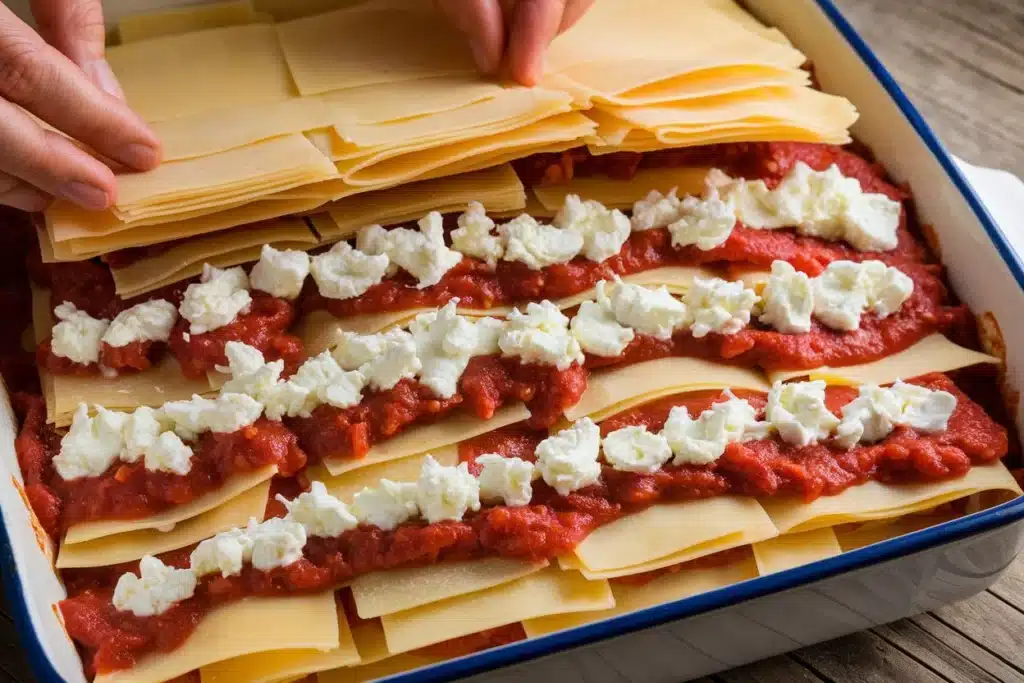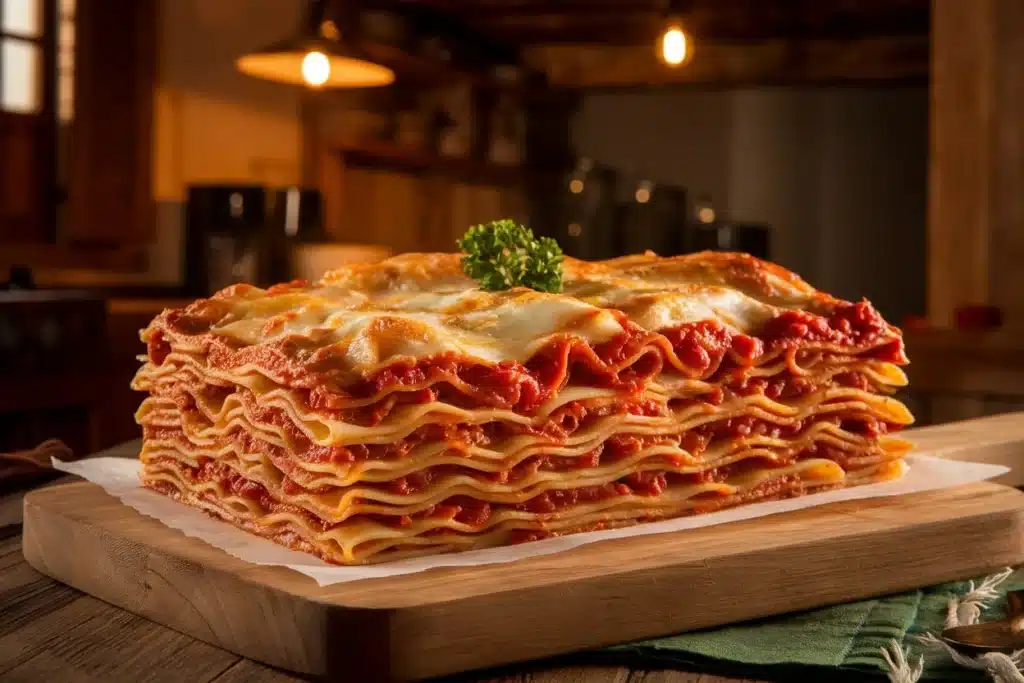The Essential Components of a Classic Lasagna
Mastering the Art of Lasagna Layers: A Complete Guide
Lasagna a timeless comfort food beloved by many. But what truly makes a lasagna perfect? It’s all about the layers! Knowing the proper order and balance of ingredients can elevate your dish from ordinary to extraordinary. Let’s dive into the secrets of building the ultimate lasagna and ensure every bite is a masterpiece.
By the end of this guide, you’ll be ready to create a perfectly layered lasagna that’s flavorful, well-structured, and sure to impress. Grab your apron, and let’s get started!
The Key Components of a Perfect Lasagna
A lasagna is like a puzzle, with each layer playing a critical role. If done incorrectly, you risk a dish that’s soggy, bland, or chaotic. Here are the essential building blocks of a classic lasagna:
- Pasta Sheets: The Structural Foundation
The pasta sheets provide the backbone of your lasagna, separating and supporting the layers. Use fresh or dried sheets, but make sure they’re pliable either pre-cooked or soaked without being overcooked. They should be tender yet firm enough to hold their shape. - Sauce: The Flavorful Glue
A rich, well-seasoned sauce is the heart of every lasagna. Whether you prefer marinara or béchamel, make it flavorful. Add garlic, basil, or chili flakes to your marinara for depth, or whip up a creamy béchamel with butter, flour, and milk for a luscious alternative. - Cheese: The Creamy Highlight
Cheese is the star that ties everything together. Mozzarella provides a gooey melt, ricotta adds creaminess, and Parmesan delivers a salty, nutty kick. For the ultimate flavor, layer them together. - Proteins and Vegetables: Customizable Fillings
This is where you can get creative. Ground beef, Italian sausage, spinach, mushrooms, or zucchini—choose your favorites! Be mindful of balance; too much protein or excess moisture from vegetables can result in a dense or watery lasagna.
How Many Layers Should Your Lasagna Have?
The ideal number of layers depends on your preference, but most lasagnas have at least three to four layers. For a more decadent and visually impressive dish, you can go up to seven layers. Just ensure each layer is evenly distributed for consistent flavor.
Tips for Layering Like a Pro
- Traditional Simplicity: Italian lasagnas often feature fewer layers with a focus on high-quality ingredients. Each layer should be thin but impactful.
- Go Big for Crowds: If you’re serving a group, more layers mean more servings—and more satisfied guests!
Common Mistakes to Avoid
- Overloading with Sauce: Too much sauce can make your lasagna soggy. Use just enough to coat each layer.
- Skipping Rest Time: Let the lasagna rest for 10-15 minutes after baking to allow the layers to set.
- Forgetting to Season: Lightly season each layer with salt and pepper to enhance overall flavor.
With these tips in hand, you’re ready to create a lasagna that’s beautifully layered, bursting with flavor, and sure to be a hit at any meal. Happy cooking!
Table: Nutrition Facts (Per Serving)
| Nutrient | Amount |
|---|---|
| Calories | 450 kcal |
| Protein | 25 g |
| Carbohydrates | 30 g |
| Fat | 20 g |
| Fiber | 3 g |
Tips for This Section:
- Keep it simple but flavorful.
- Don’t rush—good lasagna takes time.
- Enjoy the process; cooking should be fun!
Step-by-Step Guide to Layering Lasagna Correctly
Step-by-Step Guide to Layering Lasagna Correctly
Now that we’ve covered the basics, it’s time to roll up our sleeves and assemble the perfect lasagna. Whether you’re a first-timer or a seasoned chef, this step-by-step guide will help you create a dish that’s Instagram-worthy and downright delicious.
Preparing Your Ingredients: Key Tips Before You Start
Before you start layering, preparation is key. Think of it as laying the groundwork for a house—you wouldn’t start without the right materials, would you? Here’s what you’ll need:
Ingredients Checklist:
| Ingredient | Quantity |
|---|---|
| Lasagna pasta sheets | 12–15 sheets |
| Marinara sauce | 4 cups |
| Ricotta cheese | 2 cups |
| Mozzarella cheese | 3 cups (shredded) |
| Parmesan cheese | 1 cup (grated) |
| Ground beef/sausage | 1 lb (optional) |
| Vegetables (spinach, zucchini, etc.) | 2 cups (sautéed) |
Tips to Prep Like a Pro:
- Cook or soak the pasta sheets as needed. If using fresh sheets, you can skip this step.
- Brown your proteins with garlic and onions for added flavor.
- Sauté your vegetables to remove excess moisture.
- Shred and mix your cheeses ahead of time for easy layering.
Assembling the Layers: A Proven Method

Here’s where the magic happens. Follow this tried-and-true method for lasagna that’s evenly layered and packed with flavor.
1. Start with Sauce
Spread a thin layer of marinara sauce at the bottom of your baking dish. This prevents the pasta sheets from sticking and adds flavor from the get-go.
2. Lay Down the Pasta
Add a layer of pasta sheets, slightly overlapping them. Don’t leave gaps think of it as building a solid foundation.
3. Add Cheese and Protein
Spread a generous layer of ricotta cheese, followed by your cooked ground beef or veggies. Sprinkle a handful of mozzarella and Parmesan on top.
4. Repeat the Process
Continue layering in this order: sauce, pasta, ricotta, protein/veggies, mozzarella, Parmesan. Keep going until you run out of ingredients, leaving some mozzarella and Parmesan for the top.
5. Bake to Perfection
Cover your dish with foil and bake at 375°F (190°C) for 25–30 minutes. Remove the foil and bake for another 10–15 minutes to brown the top. Let your Perfect Lasagna Layers rest for 10 minutes before serving—it’ll help the layers set.
Final Touches: Baking Your Lasagna to Perfection
Even the best-layered lasagna can fall flat if it’s not baked properly. Follow these tips for a dish that’s golden, bubbly, and irresistibly delicious.
- Use a deep baking dish: Lasagna tends to expand as it cooks, so leave room at the top.
- Cover with foil initially: This traps steam and ensures the pasta cooks evenly.
- Bake on a tray: To catch any bubbling sauce that might spill over.
Table: Baking Time and Temperature
| Step | Time | Temperature |
|---|---|---|
| Covered Baking | 25–30 min | 375°F (190°C) |
| Uncovered Baking | 10–15 min | 375°F (190°C) |
| Resting Time | 10 min | — |
Common Problems When Layering Lasagna and How to Fix Them
Even with the best intentions, lasagna mishaps can happen. Here are some common issues and quick fixes:
1. Uneven Layers
- Problem: Layers slide around or look lopsided.
- Solution: Spread ingredients evenly and press each layer gently to compact it.
2. Soggy Lasagna
- Problem: Excess moisture makes your lasagna soupy.
- Solution: Pre-cook proteins and veggies, and avoid over-saucing.
3. Burnt Edges or Dry Layers
- Problem: The top layer is dry, or the edges are burnt.
- Solution: Use enough sauce and cover with foil for most of the baking time.
Creative Variations, Pro Tips

Creative Variations for Perfect Lasagna Layers
Lasagna is incredibly versatile, making it the perfect dish to experiment with. Whether you’re catering to dietary restrictions or just looking to shake things up, these creative variations will inspire your inner chef.
1. Vegetarian Lasagna: Layering Without Meat
Skip the meat and load up on veggies for a healthy, hearty twist. Use ingredients like spinach, zucchini, mushrooms, or eggplant to create flavorful, satisfying layers.
2. Gluten-Free or Low-Carb Lasagna Options
For those avoiding gluten or carbs, try these alternatives:
- Zucchini slices instead of pasta sheets.
- Cauliflower layers for a grain-free option.
- Gluten-free pasta for a more traditional texture.
3. Gourmet Twists: Unique Ingredients for Extra Flavor
Elevate your lasagna with unexpected additions:
- Pesto: Spread a thin layer between the pasta for a burst of herby goodness.
- Goat cheese: Add a tangy twist to the cheese layers.
- Seafood: Shrimp and crab add a luxurious touch to your dish.
Tips and Tricks for Perfect Lasagna Every Time
Even the simplest tweaks can elevate your Perfect Lasagna Layers from good to unforgettable. Here’s how to perfect your technique:
1. Choose the Right Pan and Tools
- Deep, rectangular pans work best for even layering and easy slicing.
- Use a rubber spatula for spreading sauces and cheeses.
2. Timing and Temperature Tips
- Always preheat your oven to ensure even cooking.
- If baking multiple trays, rotate them halfway through for consistent results.
3. Letting Your Lasagna Rest Before Serving
Resist the temptation to dig in right away! Letting your Perfect Lasagna Layers rest for 10–15 minutes helps the layers set, making it easier to slice and serve.
Frequently Asked Questions
Even seasoned chefs have questions about lasagna. Here are some of the most common ones and their answers:
Can I Prepare Lasagna Ahead of Time?
Absolutely! Assemble your Perfect Lasagna Layers up to 24 hours in advance and refrigerate it. When ready to bake, let it sit at room temperature for 30 minutes before popping it in the oven.
What’s the Best Way to Reheat Perfect Lasagna Layers?
Cover your lasagna with foil and bake at 350°F (175°C) for 20–25 minutes. For smaller portions, use a microwave with a damp paper towel over the dish to retain moisture.
Can I Freeze Perfect Lasagna Layers?
Yes! Freeze your lasagna before baking for up to 3 months. When ready to cook, bake straight from the freezer, adding an extra 20–30 minutes to the cooking time.
Can I Use Store-Bought Sauce for Perfect Lasagna Layers?
Absolutely! Store-bought marinara or béchamel sauces are convenient and can save time. To enhance flavor, consider adding fresh herbs, garlic, or spices.
Explore More Delicious Recipes
If you’re craving more ideas to perfect your table, check out these delightful recipes on Rita Flavors:
- Layering Lasagna for the Best Texture & Taste
- Smart Tips to Elevate Your Lasagna’s Flavor
- How to Make Taco Lasagna with Tortillas in 30 Minutes
Conclusion: Mastering the Perfect Lasagna Layers
Congratulations! You’ve now unlocked the secrets to creating the ultimate lasagna. Whether you stick to the classic recipe or get adventurous with variations, remember this: a great lasagna isn’t just about the ingredients it’s about the love and care you put into each layer.
So, the next time you’re craving comfort food, grab this guide and start layering your way to culinary bliss. Don’t forget to share your creations with friends and family—it’s the perfect dish to bring people together.
Happy cooking with Rita chef ❤️!
Print
Layering Lasagna Like a Pro
- Total Time: 75 minutes
- Yield: 8 servings
Description
Master the art of layering lasagna for the perfect texture and flavor. This guide will help you create a beautifully structured, flavorful lasagna that’s sure to impress. Whether you’re making a classic meat lasagna or experimenting with creative variations, these tips will ensure every bite is a delicious masterpiece.
Ingredients
12–15 lasagna pasta sheets (fresh or pre-cooked)
4 cups marinara sauce (homemade or store-bought)
2 cups ricotta cheese
3 cups shredded mozzarella cheese
1 cup grated Parmesan cheese
1 lb ground beef or Italian sausage (optional)
2 cups sautéed vegetables (spinach, zucchini, mushrooms, or your choice)
2 cloves garlic (minced)
1 small onion (chopped)
1 tbsp olive oil
1 tsp dried oregano
1 tsp dried basil
Salt and pepper to taste
Instructions
Prepare the Ingredients
Cook or soak lasagna sheets if using dried pasta
Brown the ground beef or sausage in olive oil with minced garlic and chopped onion until fully cooked, then season with salt, pepper, oregano, and basil
Sauté vegetables separately to remove excess moisture
Shred mozzarella and grate Parmesan in advance for easy layering
Start with Sauce
Spread a thin layer of marinara sauce at the bottom of a deep baking dish to prevent sticking
Layer the Pasta
Place a layer of lasagna sheets over the sauce, slightly overlapping the edges to create a solid base
Add Cheese and Fillings
Spread a layer of ricotta cheese over the pasta
Add a portion of the cooked ground beef or sautéed vegetables
Sprinkle mozzarella and Parmesan evenly over the fillings
Repeat the Layers
Continue layering in the same order: sauce, pasta, ricotta, protein/vegetables, mozzarella, Parmesan
Repeat until all ingredients are used, ending with a final layer of mozzarella and Parmesan on top
Bake the Lasagna
Cover the dish with foil and bake in a preheated oven at 375°F (190°C) for 25–30 minutes
Remove the foil and bake for an additional 10–15 minutes until the top is golden and bubbly
Rest and Serve
Let the lasagna rest for 10–15 minutes after baking to allow the layers to set before slicing and serving
Notes
For a richer flavor, add a thin layer of pesto or goat cheese between the layers
Avoid over-saucing to prevent soggy lasagna
Letting the lasagna rest after baking helps maintain its structure when sliced
For a gluten-free option, substitute pasta sheets with zucchini slices or gluten-free lasagna noodles
- Prep Time: 30 minutes
- Cook Time: 40–45 minutes
- Category: Main Course
- Method: Baking
- Cuisine: Italian
Nutrition
- Serving Size: 1 slice (1/8 of lasagna)
- Calories: 450 kcal
- Sugar: 6 g
- Sodium: 750 mg
- Fat: 20 g
- Saturated Fat: 10 g
- Unsaturated Fat: 8 g
- Trans Fat: 0.5 g
- Carbohydrates: 30 g
- Fiber: 3 g
- Protein: 25 g
- Cholesterol: 70 mg

